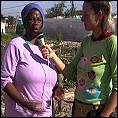Another World is plantable Part 3

- Order number: OEK10015
- Available as Video on demand:
- English
- PAL, 45 min
Format: PAL, Stereo
Duration: 45 minutes
Aspect Ratio: 4:3
Languages: English
Production: Ella von der Haide
Year of Productionr: 2007
Director: Ella von der Haide
In the film series „Another World is plantable!“ young filmmaker Ella von der Haide presents urban community gardens worldwide. In the center of the series there are activists of community gardens, their gardens and visions. They tell us why their gardens are not just green oasis in the middle of the cities, but also projects which realize "another world".
Part Two of the series shows community gardens in South Africa.

Women`s Peace Garden Driftsands, Cape Town
Community gardens are widespread in South Africa, mainly because people – most of all in the townships – are extremely poor and need food. Most of the gardens are founded and supported by governmental agencies, NGOs and private companies.
It mustn’t be forgotten that despite the fact that the black majority of the population gained political rights after the end of apartheid, most people are still very poor. The recent economic boost only benefits the rich minority. In most cases neo-liberal policies have had a negative outcome for the poor.
Health care and social benefits are not being invested in; instead they are made more expensive through privatization. As a result some people feel government and business support of poor communities is simply propaganda to distract from neo-liberalism. This becomes especially clear when you hear the Health Minister and President Mbeki saying that HIV/AIDS would be treated more effectively with garlic from community gardens, than with medication.
Nevertheless, the community gardens are places of hope, solidarity, and sometimes of active resistance against official neo-liberal politics. This is what I want to show you with four examples from the film:
- Women’s Peace Garden in the Cape Flats. A neighbourhood garden that is producing solidarity in form of vegetables for a soup kitchen and brings the women of the township together.
- Green House Project an eco-technological demonstration centre that includesa 2000-square-meter community garden in the centre of Johannesburg.
- Taifun Park a self-organized community park in Soweto.
- Itsoseng women’s Project a big self-organized productive community garden in Orange Farm that is involved in interesting political projects.
